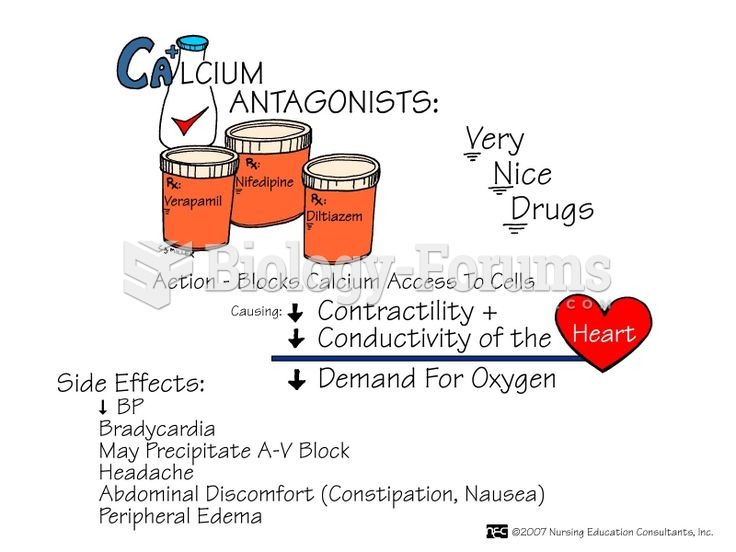Answer to Question 1
Correct Answer: 1,2,3,4
Rationale 1: Beta-adrenergic antagonists decrease cardiac workload and oxygen demands and ease acute chest pain associated with angina pectoris.
Rationale 2: Beta-adrenergic antagonists slow cardiac conduction, which is helpful in the treatment of some dysrhythmias.
Rationale 3: Some beta-adrenergic antagonists reduce intraocular pressure, which is used in the treatment of glaucoma.
Rationale 4: Beta-adrenergic antagonists are used in the treatment of hypertension.
Rationale 5: Beta-adrenergic antagonists can constrict the bronchioles and are not used in the treatment of chronic obstructive pulmonary disease.
Global Rationale: Beta-adrenergic antagonists decrease cardiac workload and oxygen demands and ease acute chest pain associated with angina pectoris; they slow cardiac conduction, which is helpful in the treatment of some dysrhythmias; some reduce intraocular pressure, which is used in the treatment of glaucoma; and they are useful in the treatment of hypertension. Beta-adrenergic antagonists can constrict the bronchioles and are not used in the treatment of chronic obstructive pulmonary disease.
Answer to Question 2
Correct Answer: 1,2,3,4
Rationale 1: Phentolamine (Regitine) is a nonselective medication that activates both alpha1 and alpha2 receptors, which can cause the adverse effect of hypotension.
Rationale 2: Phentolamine (Regitine) is a nonselective medication that activates both alpha1 and alpha2 receptors, which can cause the adverse effect of tachycardia.
Rationale 3: Phentolamine (Regitine) is a nonselective medication that activates both alpha1 and alpha2 receptors, which can cause the adverse effect of nausea.
Rationale 4: Phentolamine (Regitine) is a nonselective medication that activates both alpha1 and alpha2 receptors, which can cause the adverse effect of vomiting.
Rationale 5: Phentolamine (Regitine) is a nonselective medication that activates both alpha1 and alpha2 receptors but does not cause the adverse effect of headache.
Global Rationale: Phentolamine (Regitine) is a nonselective medication that activates both alpha1 and alpha2 receptors, which can cause the adverse effect of hypotension, tachycardia, nausea and vomiting. Headache is not a known adverse effect to this medication.






